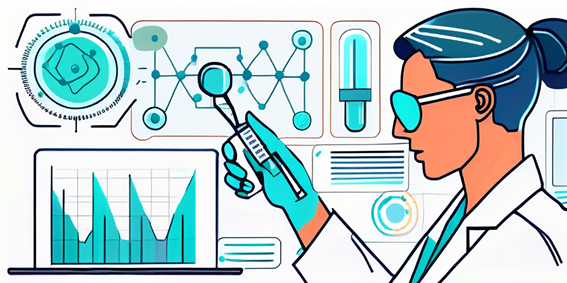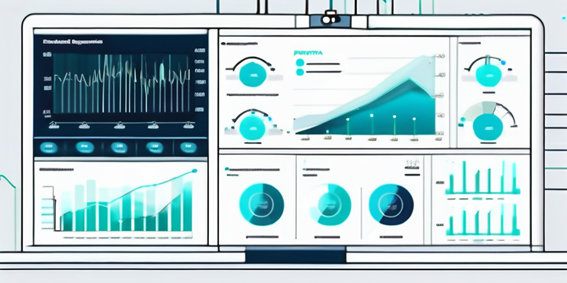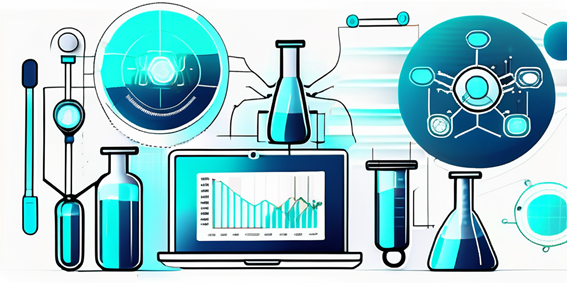In recent years, the healthcare industry has been embracing the power of predictive analytics to drive advancements in patient outcomes. This cutting-edge technology has found its way into various sectors, including pharmaceutical research and development, ultimately transforming the landscape of medicine. By leveraging data-driven insights, predictive analytics has the potential to revolutionize treatment approaches, improve patient care, and usher in a new era of personalized medicine in pharma.
Pharmaceutical research and development (R&D) is a complex and often arduous process that requires significant time, effort, and financial resources. However, with the introduction of predictive analytics, the industry has gained a powerful new tool that can enhance the efficiency and effectiveness of this critical endeavor.
By analyzing vast amounts of data from various sources such as clinical trials, electronic health records, and genetics, predictive analytics enables researchers to identify patterns, correlations, and trends that might otherwise go unnoticed. This newfound ability to derive actionable insights from complex data sets not only expedites the drug discovery process but also helps identify potential safety issues and predict drug efficacy.
Moreover, predictive analytics in pharmaceutical R&D holds the promise of reducing costs by minimizing the risk of failed clinical trials and ensuring that resources are directed towards the candidate drugs with the highest likelihood of success. By prioritizing and optimizing research efforts, pharmaceutical companies can accelerate the development of innovative treatments that have the potential to transform patient outcomes.
 One of the key advantages of predictive analytics in pharmaceutical R&D is its ability to improve patient recruitment for clinical trials. Traditionally, recruiting patients for clinical trials has been a time-consuming and challenging process. However, predictive analytics can analyze large datasets to identify potential candidates who meet specific eligibility criteria. This targeted approach not only saves time but also increases the likelihood of finding suitable participants, ultimately leading to more accurate and reliable trial results.
One of the key advantages of predictive analytics in pharmaceutical R&D is its ability to improve patient recruitment for clinical trials. Traditionally, recruiting patients for clinical trials has been a time-consuming and challenging process. However, predictive analytics can analyze large datasets to identify potential candidates who meet specific eligibility criteria. This targeted approach not only saves time but also increases the likelihood of finding suitable participants, ultimately leading to more accurate and reliable trial results.
Furthermore, predictive analytics can play a crucial role in identifying potential adverse drug reactions. By analyzing data from various sources, including electronic health records and post-market surveillance, researchers can detect patterns and signals that indicate a higher risk of adverse events. This proactive approach allows pharmaceutical companies to take necessary precautions, such as adjusting dosages or issuing warnings, to ensure patient safety.
In addition to safety considerations, predictive analytics can also contribute to the optimization of drug development timelines. By analyzing historical data on drug development processes, researchers can identify bottlenecks and inefficiencies that may cause delays. This insight enables them to streamline workflows, allocate resources more effectively, and make informed decisions to accelerate the overall drug development timeline.
Another area where predictive analytics can make a significant impact is in personalized medicine. By analyzing genetic data and patient characteristics, researchers can identify subpopulations that are more likely to respond positively to a particular drug. This knowledge allows for targeted treatment approaches, reducing the risk of adverse reactions and increasing the likelihood of successful outcomes for individual patients.
Moreover, predictive analytics can aid in the identification of potential drug-drug interactions. By analyzing data on drug combinations and their effects, researchers can identify potential interactions that may lead to adverse events or reduced efficacy. This information can help healthcare professionals make more informed decisions when prescribing medications, ultimately improving patient safety and treatment outcomes.
Overall, the role of predictive analytics in pharmaceutical research and development is transformative. By harnessing the power of data analysis, researchers can uncover valuable insights, optimize processes, and improve patient outcomes. As technology continues to advance, the potential for predictive analytics to revolutionize the pharmaceutical industry is vast, offering new possibilities for drug discovery, development, and personalized medicine.
Beyond research and development, predictive analytics is revolutionizing the healthcare industry by playing a pivotal role in improving patient care. The ability to analyze data from electronic health records, wearables, and other sources provides healthcare professionals with a treasure trove of valuable information that can guide clinical decision-making and enhance patient outcomes.
With predictive analytics, healthcare providers can go beyond reactive care and take a proactive approach to patient management. By better identifying patients who are at risk of developing certain conditions or experiencing adverse events, healthcare professionals can implement timely interventions to prevent disease progression or mitigate potential complications. This personalized approach to patient care not only improves patient outcomes but also reduces healthcare costs by focusing resources on preventative measures rather than costly treatments.

Imagine a scenario where a patient’s electronic health records, combined with data from their wearable devices, are analyzed using predictive analytics. This analysis could reveal patterns and trends that indicate a higher risk of developing a specific condition. Armed with this knowledge, healthcare providers can initiate preventive measures such as lifestyle modifications, targeted screenings, or early interventions to minimize the impact of the condition on the patient’s health.
Furthermore, the continuous monitoring and analysis of patient data through predictive analytics can provide healthcare providers with valuable insights into treatment response. By tracking the effectiveness of different therapies and interventions, healthcare professionals can make data-driven decisions to adjust therapy plans accordingly. This iterative process ensures that patients receive the most effective and tailored treatment, leading to improved outcomes and a higher quality of life.
For instance, consider a patient with a chronic condition who is being treated with a specific medication. Through predictive analytics, healthcare providers can monitor the patient’s response to the medication and identify any potential side effects or adverse reactions. Armed with this information, adjustments can be made to the dosage or alternative treatment options can be explored, ensuring that the patient receives the most optimal care.
Predictive analytics in the pharmaceutical industry also holds great promise for drug discovery and development. By analyzing vast amounts of data, including genetic information, clinical trial results, and real-world evidence, researchers can identify potential drug targets, predict drug efficacy, and optimize clinical trial designs. This data-driven approach not only accelerates the drug development process but also increases the chances of success in bringing new therapies to market.
In conclusion, predictive analytics is transforming patient care by harnessing the power of data. By leveraging electronic health records, wearables, and other sources of information, healthcare providers can make informed decisions, personalize treatment plans, and improve patient outcomes. The potential of predictive analytics in the healthcare industry is vast, and as technology advances and more data becomes available, its impact will only continue to grow.
The introduction of predictive analytics has significantly impacted treatment approaches in the pharmaceutical industry. Traditionally, treatments were often developed based on population averages, leading to a one-size-fits-all approach that may not be optimal for every patient. However, with the advent of predictive analytics, personalized medicine has become a reality.
By integrating patient-specific data, such as genetic information, lifestyle factors, and medical history, predictive analytics enables healthcare providers to tailor treatment plans to individual patients. This personalized approach not only increases treatment efficacy but also minimizes the risk of adverse events.
Furthermore, predictive analytics allows for the identification of patient subgroups that may respond better to certain treatments. By leveraging this knowledge, pharmaceutical companies can develop targeted therapies for specific populations, thereby maximizing treatment benefits and minimizing side effects.
Personalized medicine, also known as precision medicine, is an emerging field that aims to deliver the right treatment to the right patient at the right time. Predictive analytics plays a central role in driving the advancement of personalized medicine in the pharmaceutical industry.
Through the analysis of big data, including genetic information, biomarkers, and clinical data, predictive analytics enables healthcare professionals to identify patients who are more likely to respond positively to a specific treatment. This information allows for the customization of treatment plans that optimize patient outcomes.
 Moreover, predictive analytics can help predict disease progression, enabling early interventions that can significantly impact patient outcomes. By identifying individuals at high risk of developing certain conditions, healthcare providers can implement preventive measures and lifestyle interventions to mitigate or delay disease onset.
Moreover, predictive analytics can help predict disease progression, enabling early interventions that can significantly impact patient outcomes. By identifying individuals at high risk of developing certain conditions, healthcare providers can implement preventive measures and lifestyle interventions to mitigate or delay disease onset.
Overall, predictive analytics holds the potential to transform personalized medicine by providing healthcare professionals with evidence-based insights that guide treatment decisions, improve patient outcomes, and ensure the delivery of individualized care.
While the adoption of predictive analytics in pharma offers tremendous potential, it is not without challenges. Implementing this technology requires a robust infrastructure, data governance, and the availability of high-quality data. Additionally, there are ethical considerations surrounding data privacy and security that must be addressed.
One best practice in the implementation of predictive analytics is collaboration between various stakeholders, including pharmaceutical companies, technology vendors, healthcare providers, and regulatory bodies. By working together, these parties can share expertise, resources, and data to generate more accurate models and drive innovation in the field.
Furthermore, developing a culture of data-driven decision-making and fostering data literacy among healthcare professionals is crucial. Educating and training clinicians on how to interpret and use predictive analytics insights effectively can empower them to make informed decisions that ultimately improve patient outcomes.
As the predictive analytics landscape continues to evolve, it is essential for the pharmaceutical industry to adapt and stay informed about the latest advancements. Embracing this transformative technology and overcoming the associated challenges can lead to improved patient outcomes and ultimately revolutionize the practice of medicine.